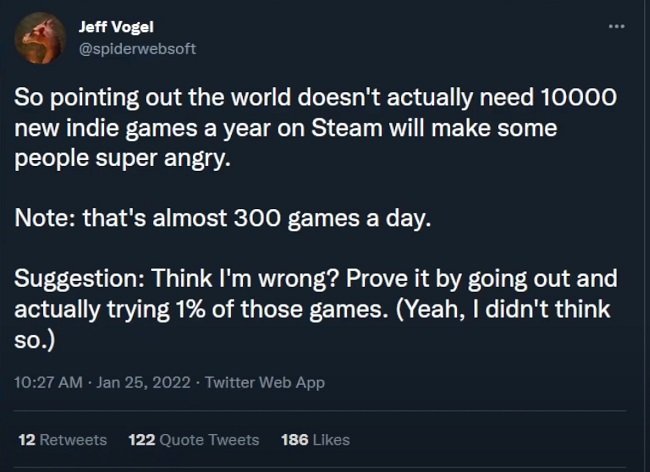"The World Doesn't Actually Need 10,000 New Indie Games a Year"
One of the reasons I’m not that engaged with politics at the moment is because so many people’s opinions are based upon spurious data, misconceptions and logical fallacies. There are too many hot takes that are based on bluster, faux outrage and a fundamental dislike or fear of change. Sadly, speaking before thinking seems to have become commonplace and has filtered down from political discourse into pretty much every other aspect of public discourse. The furiously hard-of-thinking dominate most public spaces and seem ready to pounce on any subject being debated with an angry, knee-jerk opinion. It is all very wearing. It would seem that being angry about someone or something is as addictive as heroin and a lot cheaper. However, it is equally just as damaging to society.
All of which brings me to recent Tweets made by software developer and businessman Jeff Vogel. Please note I have combined three of these in chronological order so we can see the full context of the points he was making. According to Mr Vogel, “When I started writing games for $$$ (1994), it was a weird eccentric thing to do and I didn't think I would make a penny. If I was starting out today, would I write video games? Almost undoubtedly not. This is a whole lot of young, smart, driven people making things nobody wants. At what point does this become a profound waste of human talent? So pointing out the world doesn't actually need 10000 new indie games a year on Steam will make some people super angry. Note: that's almost 300 games a day. Suggestion: Think I'm wrong? Prove it by going out and actually trying 1% of those games. (Yeah, I didn't think so)”.
It can be argued that if one overlooks the emotive element of Mr Vogel’s statement, there are indeed a lot of indie games produced for what is essentially a finite market. Therefore, many will fail commercially and struggle to get noticed. That part of his statement is correct on a logical basis. Beyond this point his words are personal and subjective musings on what people do with their lives and the projects that they invest their time into. He posits in subsequent Tweets that maybe people should put their efforts into other things as society still has lots of ills that need addressing. “The game industry doesn't care about this, it's too big. I think it's more about how it's a massive misallocation of talent. What forces are driving so many people to work so hard making something nobody wants, while so much of society in general is increasingly non-functional?”
The point that Jeff Vogel is making is an old one. I’ve made it myself in past posts. Essentially wouldn’t it be nice if people put the same level of energy and passion that they do with personal projects, into other things that are beneficial for wider society? For example if a local football club is going to be closed, the supporters will lobby hard to prevent it. Would they show the same dedication for a school or a hospital? However, beyond speculation, there is no practical solution to this philosophical conundrum. Because people tend not to think in such terms. For example, when my caring duties end, I shall have to find work. Given my qualifications and skills, returning to the field of IT would be logical, practical and possibly lucrative. It could also be argued as being “beneficial” for the economy and society. However, I do not wish to do this and therefore will not do so unless there is no other option. I wish to pursue a writing career although that will be far harder and pays less.
One of the problems with neoliberalism is that it goes hand in hand with the American dream; the belief that anyone, regardless of where they were born or what class they were born into, can attain their own version of success in a society in which upward mobility is possible for everyone. Hence people pursue what they’d like to do, rather than what may be most beneficial and practical. Hence so many people aspire to be “influencers” on Twitch TV and YouTube, rather than become an administrator for a firm of quantity surveyors. Does this say something about the state of the job market and people’s relationship with everyday life? I’m sure it does. You only have to read the late David Graeber’s book Bullshit Jobs to get an overview of how broken capitalism is for those not at the top. Hence people will pursue the seemingly impossible dream of developing an indie game, rather than endure the iniquities of soul crushingly pointless, underpaid work and having to interact with sociopathic management and social dysfunctional work colleagues.
Perhaps Jeff Vogel may wish to reflect on the following. Firstly, he and nobody else is the gatekeeper of indie games development or anything else for that matter. Any statement that directly or indirectly casts you in such a light is an error of judgement and will certainly provoke a reaction. Secondly, artistic endeavours and pursuing creative activities is enormously beneficial for both the artist and those who experience the resulting work of art. Creating something is not always about being financially successful. There is mental wellbeing, catharsis, mental discipline and a wealth of other benefits. This is why “the arts” are often subsidised in many countries. Art is a process of learning to create ourselves and experience the world in new ways. It supports the bigger view of life: beauty, symbols, spirituality, storytelling, and allows us to be present in the moment. Just because you can’t put a price on something doesn’t mean it’s invalid.
I don’t know that much about Jeff Vogel personally, so I can’t determine whether his Tweets are in good faith or deliberately designed to stir up an internet storm. If I assume that he meant what he said without malice, then perhaps his mistake was the way he phrased and presented his thoughts. If they had been less imperative and presented more as a point of consideration, then maybe they would have been met with less opprobrium. Perhaps such rhetorical questions as “the world doesn't actually need 10,000 new indie games a year” ultimately serve no purpose because of the nature of the human condition. We don’t run on pure logic. It is also a very problematic line of argument that can potentially be usurped to frame allsorts of other unpleasant concepts in a superficially “reasonable light”. Ultimately, the argument if taken to its inevitable conclusion would lead to group A dictating what group B does. That seldom ends well, especially in today’s political climate. People don’t take well to being told what to do. Irrespective of its rectitude.





























